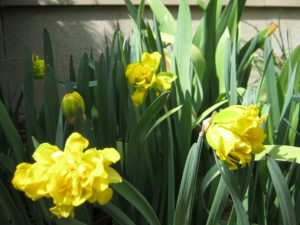To See What You Couldn’t See Then
 Another Easter Sunday has come, and, again, I’m thinking of my mother. I’ve written often of my years between third grade and high school when we lived in Oak Forest, a southern suburb of Chicago. We traveled back to our downstate farm some weekends, and on holidays, and in the summers. We were always on the road on Easter, heading north up route 49. Somewhere north of Cissna Park, just before we hit route 50, which would take us into Oak Forest, we stopped at a smorgasbord restaurant. By this time, it would be late in the afternoon and the Easter rush would be over, and we’d linger over our meal in the nearly empty dining room, almost home, but not quite. It was there one rainy Sunday when my mother said it was a sign that it would rain the next seven Sundays. “Mercy,” she said, looking out the rain streaked window near our table, “just look at it rain.”
Another Easter Sunday has come, and, again, I’m thinking of my mother. I’ve written often of my years between third grade and high school when we lived in Oak Forest, a southern suburb of Chicago. We traveled back to our downstate farm some weekends, and on holidays, and in the summers. We were always on the road on Easter, heading north up route 49. Somewhere north of Cissna Park, just before we hit route 50, which would take us into Oak Forest, we stopped at a smorgasbord restaurant. By this time, it would be late in the afternoon and the Easter rush would be over, and we’d linger over our meal in the nearly empty dining room, almost home, but not quite. It was there one rainy Sunday when my mother said it was a sign that it would rain the next seven Sundays. “Mercy,” she said, looking out the rain streaked window near our table, “just look at it rain.”
At the time, I was, like most kids, totally self-absorbed. If something didn’t involve me, I pretty much ignored it. When my mother said what she did about the rain, though, I got curious. How could she forecast seven consecutive Sundays of rain? It was an old wives’ tale, my father explained. Not a bit of truth in it.
Except the fact that my mother was, to put it bluntly, an old wife. She was forty-five when I was born, and at the time I’m remembering she would have been well over fifty. I’d grown accustomed to the age difference between my parents and those of my friends, so even though I took note of the lore that rain on Easter meant seven consecutive Sundays of similar weather, I failed to hear what my mother was really saying when she said, “Mercy, just look at it rain.” Subtext often escapes the young, and that was certainly the case with me that day. Looking back on it now, I hear what my mother didn’t say—that she was tired. The burdens of her life—her parenting at an advanced age, her teaching, her work on the farm come summers, my father’s often explosive temper and all she had to do for him after he lost both of his hands in a farming accident—were bearing down upon her, and looking out at the rain on this dreary day had caused her to ask for mercy. I was too young to realize that at the time, but the memory stayed with me and even haunted me from time to time. It still does.
So here’s a writing activity designed to express something you know now that you didn’t know then. The exercise is designed with the writer of memoir in mind, but it could easily work in a piece of fiction or a poem like this one from Robert Hayden:
Those Winter Sundays
Sundays too my father got up early
and put his clothes on in the blueblack cold,
then with cracked hands that ached
from labor in the weekday weather made
banked fires blaze. No one ever thanked him.
I’d wake and hear the cold splintering, breaking.
When the rooms were warm, he’d call,
and slowly I would rise and dress,
fearing the chronic angers of that house,
Speaking indifferently to him,
who had driven out the cold
and polished my good shoes as well.
What did I know, what did I know
of love’s austere and lonely offices?
The speaker in the poem catalogs the facts of those winter Sundays when his father would rise early to attend to the furnace that would warm the house before the son woke and found his father had polished his good shoes. This is what the speaker knows at the time. What he doesn’t know, and can only know in retrospect, is “love’s austere and lonely offices,” and how the tending of the furnace and the polishing of the shoes express a father’s unconditional love.
Please feel free to go back in memory to a moment that has stayed with you, probably because it was more complex than you could realize at the time. Put that moment on the page—perhaps it was something a family member said or did—and use the greater wisdom time and distance have given you to see what you couldn’t see then.